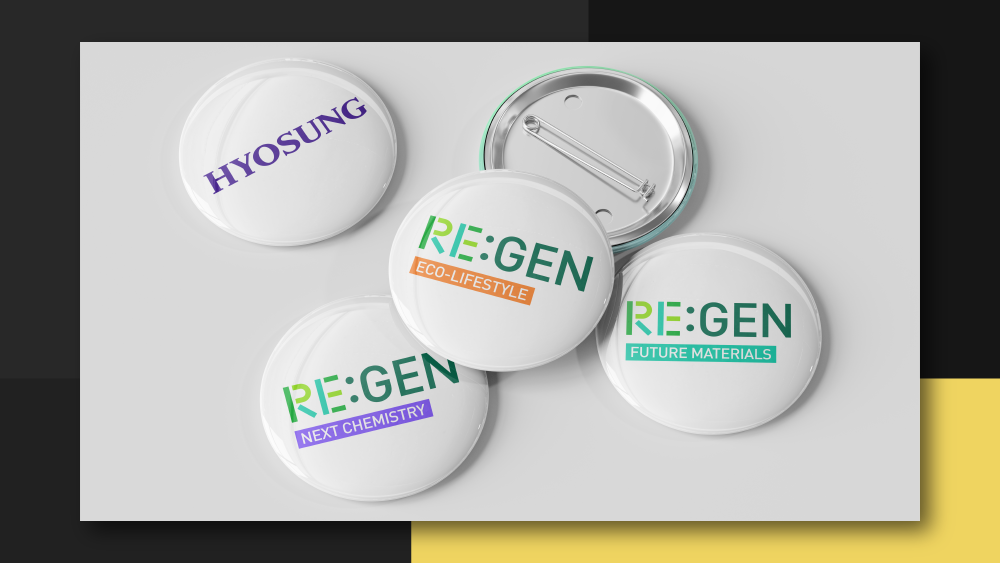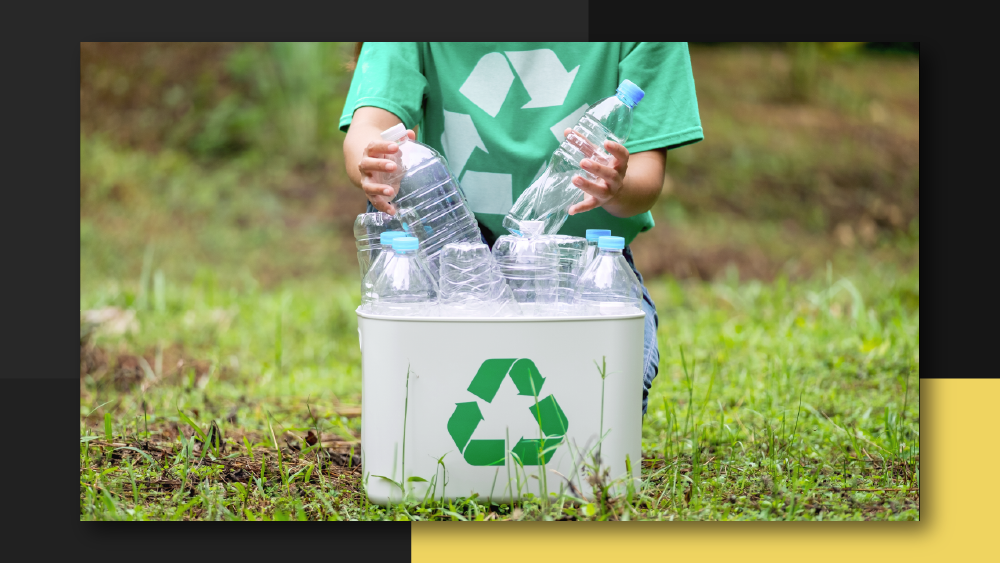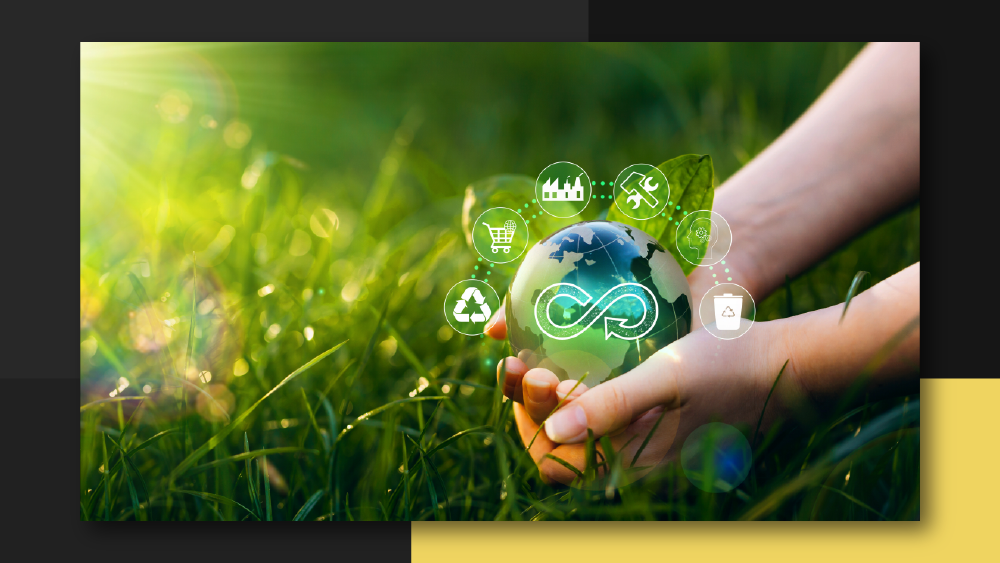RE:GEN 1. Circular Economy
2023.06.12

The devastating impact of discarded plastics on our oceans and the emergence of a massive garbage island in the Pacific are not new issues. Unless we stop using resources altogether, we will continue to generate waste at an alarming rate, posing a significant environmental challenge.
Hyosung recognized this problem and began researching ways to protect our planet and its resources long before the crisis hit. Hyosung’s efforts led to the developing of a circular economy system that revolves around its product line. This system aims to create a closed-loop cycle that starts with discarded plastics and ends with the final product, ultimately achieving a zero-waste ecosystem. Hyosung's commitment to leading the way in building such a system is a testament to their dedication to the environment.

The Circular Economy Story of RE:GEN
For the sustainable lives of future generations, Hyosung aspires to implement authentic ESG management across all its business units, centered around five themes: recycling, upcycling for a circular economy, carbon neutrality, renewable energy, and smart reduction. RE:GEN, Hyosung’s ESG brand, is built on these themes.
Through RE:GEN, an acronym for 'Reply to Every Generation's Future,' Hyosung strives to leave a more habitable Earth for future generations. As part of this pursuit, innovative solutions are proposed based on the core values of a circular economy, carbon neutrality, renewable energy infrastructure, and resource conservation.
Hyosung's initially focused on establishing a circular economy system based on its three chemical companies. Because so much of what we use is made of plastic, it isn't an exaggeration to call the planet we live on a plastic planet. While plastic has made our lives convenient, it has contaminated the Earth's ecosystem, and unbeknownst to us, microplastics ingested are jeopardizing our health. Reducing plastic use is a fundamental solution, but it is challenging to achieve immediately, so Hyosung decided to recycle plastic to build an ecosystem for a circular economy. Conserving the Earth's limited resources and reducing waste are important, but minimizing and reincarnating waste as a new resource is equally significant.
The circular economy that Hyosung envisions a circular economy in which waste materials are transformed into high-value products, creating a zero-waste ecosystem. The circular economy promoted by RE:GEN embodies core values of a circular supply chain, eco-friendly brand platform, and leading the establishment of a global eco-friendly market ecosystem. To realize a circular economy, they intend to build a circular supply chain that converts waste into resources, establish an eco-friendly brand platform that produces sustainable products with zero-waste, and form partnerships with various global eco-friendly companies.
Hyosung's Efforts for a Circular Economy - ① Hyosung TNC
Hyosung needs to invest more actively to practice a circular economy that breathes new life into resources. This initiative is supported by Hyosung TNC, Hyosung Chemical, and Hyosung Advanced Materials. In 2007, when environmental concerns were relatively low, Hyosung TNC developed a world-first technology to produce regen nylon yarn from discarded fishing nets. In 2008, they were the first in Korea to successfully develop and produce regen polyester yarn by recycling waste PET bottles. They develop and produce a variety of eco-friendly fibers, including regen ocean nylon, regen polyester from recycling plastics, and regen polyester born from recycling discarded PET bottles.
Hyosung TNC is undertaking three phases of research, development, and commercialization of eco-friendly yarns for the circular economy. The first phase involves eco-friendly fibers, regen, created through recycling, as mentioned earlier. The second phase is represented by bio-fibers, such as regen bio-based, made from plant resources using corn extract as raw material. Hyosung TNC has developed world-first technology in producing raw materials for high-functionality fibers using corn resources instead of petroleum chemistry through biomass technology. The final third phase involves biodegradable fibers. Hyosung TNC is currently conducting relentless research for the developing and commercializing biodegradable yarns.

Hyosung's Efforts for a Circular Economy - ② Hyosung Advanced Materials
Hyosung Advanced Materials holds the world's number-one position in the field of PET tire cords. Hyosung Advanced Materials has developed high-strength Recycled PET yarn using materials extracted from waste PET bottles and industrial Bio-PET yarn produced from plant-derived materials. They are applying these developments to tire cords and are constantly researching and developing to meet a wide range of eco-friendly needs. Hyosung Advanced Materials, which strives to use eco-friendly materials, is leading the development of new materials with outstanding application potential and carbon reduction effects, like carbon fiber, TANSOME®, which it has developed using its own technology.
Carbon fiber is lighter than iron and has higher strength, making it applicable to various industries. Its production also reduces carbon emissions. It is especially recognized as a necessary material for commercializing hydrogen cars and is expected to be the key to advancing the transition to hydrogen energy. Hyosung Advanced Materials' development of new materials that reduce carbon emissions and apply to various industries can secure future growth drivers and guide a greener path.
Hyosung's Efforts for a Circular Economy - ③ Hyosung Chemical
The use of chemicals has made our lives easier and opened up new opportunities, but they have also exposed us to dangers, such as the release of carbon dioxide. Hyosung Chemical focuses on producing materials for human life more safely and sustainably rather than just seeking convenience for mankind through chemicals. Hyosung Chemical aims to develop eco-friendly products that use Post-consumer recycled pp (PCR PP) raw materials to ensure a sustainable future for mankind. As part of its initiatives, it has developed a project to replace disposable containers used in sports stadiums with reusable containers made of PP.
Moreover, they are developing eco-friendly products using PET bottle recycled chip (PCR PET) raw materials for PU films. They are also developing recycling technology that re-collects silicone release coating products, which are disposed of after use by customers and reintroduces them into Hyosung Chemical's process. As part of its commitment to circular chemistry, Hyosung Chemical is researching a chemistry for the next generation that can offer humanity greater possibilities more safely and sustainably.

Plastic was an innovation when it was developed and made our lives more convenient. It is stigmatized as an environmentally damaging, wasteful resource and treated as an unwanted annoyance. The emergence of microplastic issues has made plastic a harmful resource that threatens the environment and our health. The convenience of plastic, however, remains irreplaceable. Hyosung holds a vision to build an ecosystem of a circular economy that recycles and replaces plastics, considering the future and environment of the Earth.
Hyosung is dedicated to recycling and replacing plastic to create a circular economy ecosystem that prioritizes the future and the environment. Hyosung aims to revive plastic and allow resources to circulate, benefiting all life on Earth, including future generations. Hyosung Group believes that reducing the use of new plastic and repurposing used plastic can make the world healthier, and the company is committed to finding new ways to circulate resources.